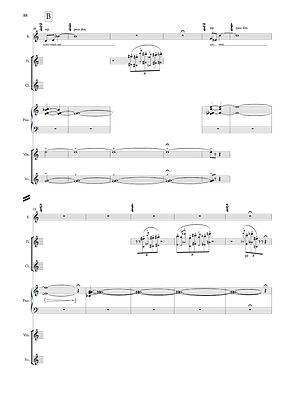POEMS OF SHEER NOTHINGNESS
Soprano, Flute, Clarinet, Violin, Cello, Piano
35-40 min.
2013
(full recording available on Spotify and Apple Music)
I remember a sunny day in San Diego. A friend was selling piles of books out on his front lawn. The birds were chirping outside. There was a light breeze licking the tree branches. I was digging through a box of poetry and found an old book of Occitan troubadour song texts. I liked the way the language looked on the page, so I bought the book for a dollar and took it home. It sat on the shelf for a couple weeks. When I finally cracked it open, it fell haphazardly on a poem by Guillaume de Poitiers that began in a very strange way:
“I’ll make a poem of sheer nothingness. Not of me, nor of any other. Not of love, nor of youth, nor of anything else. Because it was composed while dreaming on a horse.”
It was a baffling introduction (to an otherwise completely typical love ballad) about the act of writing the song itself. Thumbing through the book, I found more of these bizarre preludes, all of them in verse and presumably set to music that was lost a long time ago. Some were explanations of the poet’s craft. Some were apologies for poor rhyme. Some were pained second thoughts about singing. Some were warnings for those who would try and follow suit. All of them seemed both timeless and utterly contemporary.
Poems of sheer nothingness presents five of these introductions in their original Occitan, set to transcriptions of recordings from my own work sessions while composing the music. It seems trivial to say I transcribed recordings of the vocal and instrumental music I was writing. What is composing if not writing down music you’re working on? But I also captured other sounds — the birds outside my window, distant train whistles, even the pauses and back-trackings between bursts of improvisation…all meticulously notated. These transcriptions became the material for the songs, fragmented and collaged together. The music, like the text, is a poetic record of its own making.
And so these five songs are not “settings” in the traditional sense. They’re also not recreations. They are encounters between two imaginations, separated by nearly a millennium. They are beguiling, but also revealing. "E far l’ai tal que sen sela," as Raimbaut d’Orange says in the second song. “I’ll make it such of sense concealed,” but also homophonically “I’ll make her song such that its sense is hers.” For we who make song must remember that we sing to the ears of others. That the price of being listened to is being heard. That we must be careful when we whisper nothings, for they are not always so sweet as we'd wish them to be.





